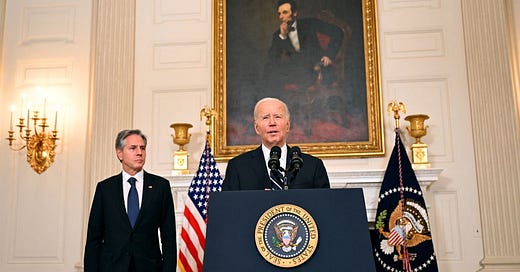
The Free Press

As Hamas gunmen were in the initial stages of a raid that has left more than 700 dead, 2,408 wounded, and at least 100 held hostage in Gaza, the U.S. Office of Palestinian Affairs in Jerusalem weighed in on the unfolding horror.
“We unequivocally condemn the attack of Hamas terrorists and the loss of life that has incurred,” the official X account for the office posted. “We urge all sides to refrain from violence and retaliatory attacks. Terror and violence solve nothing.”
Observers of America’s policy in the Middle East will recognize the telltale talking points: the urging of restraint in the face of terror; the implied cycle of violence. The peace process has been dead for years, but the mindset behind it survives.
Let’s be clear. The timing of these diplomatic platitudes was grotesque. Here was the official bureau of the U.S. embassy in Jerusalem, which deals with the Palestinian Authority, calling on Israel to refrain from responding to the worst slaughter of innocent Jews since the Holocaust.
The original post was soon erased. Subsequent statements from President Biden and his senior advisers have dropped the both-sidesism and focused instead on Israel’s right to defend herself.
Nevertheless, this administration has a serious problem. While the official rhetorical response to the attack has been strong, there is a wide chasm between the president’s words and his administration’s actions.
Since taking office, the Biden administration has taken numerous steps to relieve pressure on Hamas and its international patrons as a means of restoring U.S. foreign policy to the way it was under Barack Obama, complete with a resurrected Iran nuclear deal.
Until last week, the Biden administration considered its approach to the region a success. Speaking at an Atlantic magazine event on September 8, National Security Adviser Jake Sullivan boasted, “The Middle East region is quieter today than it has been in two decades.”
After this weekend, the administration’s Middle East strategy is in tatters. And the self-delusion among our foreign policy establishment is at the root of the problem.
Let’s start with Biden’s policy to restore U.S. funding for Palestinian development after the Trump administration ended it. As The Washington Free Beacon first reported in August, internal documents show the State Department, in 2021, secretly sought a Treasury Department exemption to release more than $360 million to Palestine despite concerns that at least some of it would go to Hamas. (According to a May 2021 State Department press release, that money went to humanitarian organizations providing, among other things, emergency shelter, food, and healthcare, including “mental health and psychosocial support.”)
But the story, based on the State Department’s own documents and obtained through a Freedom of Information Act request, is damning. A draft application for the exemption says, “We assess there is a high risk Hamas could potentially derive indirect, unintentional benefit from U.S. assistance to Gaza.” (This document was co-authored by then-acting assistant secretary of state for Near Eastern Affairs Joey Hood and then-deputy assistant secretary of state for legislative affairs Naz Durakoğlu.)
This raises an obvious question after the slaughter on Saturday: was the bulldozer that Hamas used to demolish a border fence between Israel and Gaza, which opened a path for terrorists to flood into Jewish towns and kibbutzim, paid for in part with U.S. development aid?
But even more troubling for the Biden administration is the situation in Iran, which has funded and trained Hamas since the 1990s. On Sunday, The Wall Street Journal laid bare the Islamic Republic’s deep involvement in this weekend’s bloodshed, reporting that “Iranian security officials helped plan Hamas’s Saturday surprise attack on Israel and gave the green light for the assault at a meeting in Beirut last Monday, according to senior members of Hamas and Hezbollah, another Iran-backed militant group.”
Just last month, Biden allowed the release of $6 billion in oil revenues back to an Iranian bank account in Qatar in exchange for the release of five hostages. That money had been frozen because of U.S. sanctions on Iran’s oil exports.
No evidence has emerged that any of that money went toward the Hamas operation. Indeed, a senior Treasury official, Brian Nelson, took to X on Saturday to make this point. “All of the money held in restricted accounts in Doha as part of the arrangement to secure the release of 5 Americans in September remains in Doha.”
That said, it’s clear that the ransom paid to Iran will free up funding for its regional proxy war against America and its allies. That proxy war will almost certainly involve helping Hamas perfect its use of long-range rockets and killer drones.
The Biden administration must now reckon with the fact that it has done a deal with Hamas’s most powerful and important patron. Biden’s efforts to restore a nuclear deal with Iran and its lax enforcement of secondary sanctions have freed up capital for the Islamic Republic to invest in its terrorist proxy.
And let’s not forget Biden’s strategy with Qatar, another backer of Hamas. On January 31, 2022, President Biden named Qatar as a “major non-NATO ally.” This designation was a major diplomatic reward for a country that to this day allows much of the senior leadership of Hamas, including its political leader, Ismail Haniyeh, to live there. (That U.S.-Qatari deal did not include conditions to expel these figures.)
On Saturday, Qatar’s foreign ministry issued a statement that said Israel was “solely responsible for the ongoing escalation.”
The U.S. response?
Silence, except for a report that the U.S. Secretary of State Antony Blinken and Qatar’s Foreign Minister Mohammed bin Abdulrahman Al Thani “agreed to remain closely coordinated.”
Considering their many missteps, it’s no surprise the White House is on the defensive. Responding to Republicans who brought up the $6 billion hostage deal, National Security Council spokeswoman Adrienne Watson said on Saturday, “These funds have absolutely nothing to do with the horrific attacks today, and this is not the time to spread disinformation.”
Ah yes, another case of “disinformation” misleading Americans into thinking their government’s policy is misguided. In this case, though, the real deception is the one that has led so many in the U.S. foreign policy establishment to think that with enough patience, engagement, and money, fanatical regimes like those in Tehran and Gaza can be enticed to join the civilized world.
Eli Lake is a Free Press columnist and host of The Re-Education podcast. Follow him on X (formerly Twitter) at @EliLake. For more on Hamas’s attack, read Noah Pollak on why Saturday was Israel’s 9/11.
Become a Free Press subscriber today:














Biden projects weakness and senility. It's a bad look for the leader of the west.
I don't know about anyone else but I'm really enjoying the return to normalcy that the Biden campaign promised us.